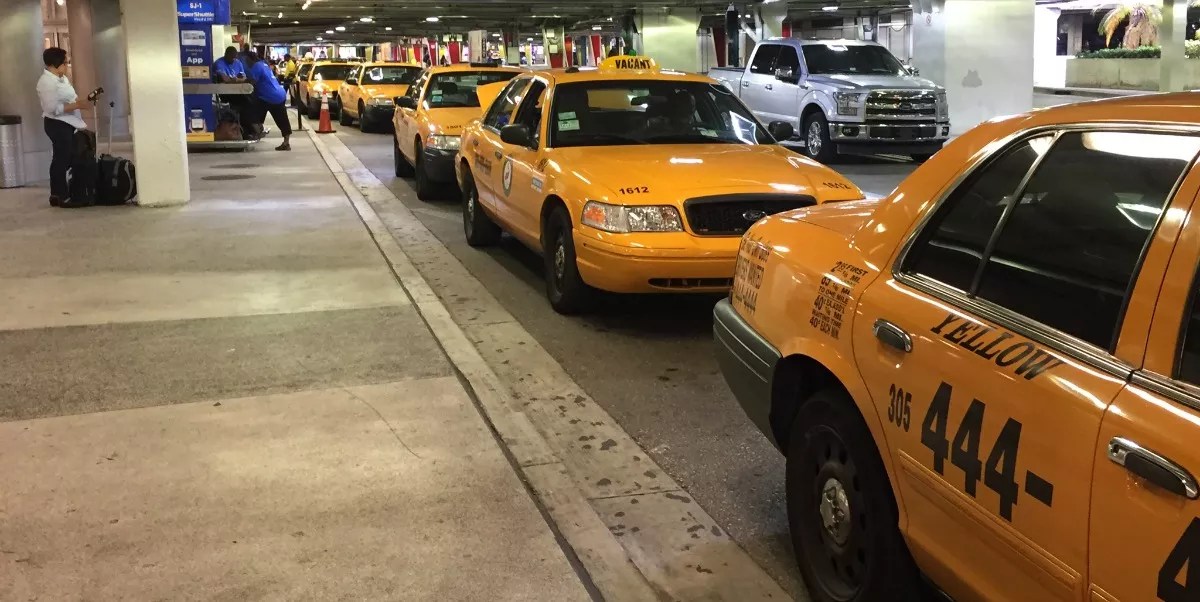
Photo by Isabella Gomes

Audio By Carbonatix
Marty Ruda lays a brown leather briefcase in the back of his car, gets in the driver’s seat, and straightens his shirt, a burgundy polo with two ballpoint pens clipped to the lapel. He works as an investigator for his son-in-law’s personal injury firm and says it’s time to head back to work. About 20 years ago, Ruda thought he’d retire at age 68, but with his 70th birthday approaching in a couple of months, he laments, “God knows.”
About two decades ago, Ruda became one of many Miamians to own medallions, which are county-issued permits to operate taxicabs. Owners could either use the medallions for their own vehicles, lease them to cab companies, or resell them. Believing they would be a safe investment, Ruda and his brother pooled their savings and purchased nine medallions for about $100,000 each. “Like others, I counted on [them] for retirement.” At the time, it seemed like a good call because medallions were dramatically rising in value. But then, in 2014, Uber and Lyft swamped Miami’s transportation industry, and the medallion market crashed. Within two years, medallions, worth $350,000 at their peak, dropped in value by 90 percent.
Born and raised in Israel, Ruda moved to New York with his family in 1962, seeking better economic opportunity in the midst of the Israeli-Palestinian conflict. A few years later, Ruda graduated from City College of New York with a degree in engineering and spent a decade working for Sperry Rand, an IT company. Eventually, he and his brother started their own custom furniture business. Cabinets were their specialty. With the profits they saved from the business, the two decided to invest in the taxi industry. “Some people get a 401(k); others buy real estate in Miami Beach or West Palm Beach. We bought medallions.”
Medallions were first issued by county commissioners in 1998 as part of an effort to reform licensing protocol. Originally, drivers were required to obtain individual licenses from municipalities, but county-issued medallions were considered “intangible property,” meaning owners could use them as collateral for loans. The county issued only 27 to 38 new medallions each year. Buyers, chosen by a lottery, paid anywhere from $5,000 to $25,000 for each new medallion, depending upon the type (regular, wheelchair, or underserved area). Once a medallion was acquired, the owner could choose to resell it on a private market.
But in 2012, county commissioners issued their last batch of taxicab medallions, putting a ceiling on the number of cabs that could operate in Miami-Dade. That same year, the county also auctioned six medallions. They fetched an average of $400,000 each. “It shows that [the county] knew how much these medallions were worth,” Ruda says.
But then, in summer 2014, Uber and Lyft hit the scene. Initially, local laws prohibited them from infringing upon the taxi industry’s business, though the drivers often skirted regulations and continued to operate throughout the county. Code enforcement officers cited violators and, in some cases, seized vehicles. Ultimately, the county commissioners caved, overhauling the previous laws and legalizing Uber’s operations.
Ruda calls it “criminal.” He says Uber and Lyft not only entered the market illegally but also avoided paying for permits as taxi drivers do with medallions. “It’s just not the same playing field,” he says. By 2017, Uber’s empire alone had about 10,000 drivers, fivefold the number of taxis operating in the county.
Recently, about 2,000 cab drivers united to sue the county for $1 billion in damages, citing legalization of Uber and Lyft, but a judge tossed the case. Eventually, the taxi industry lost the bulk of its clientele to Uber and Lyft. According to the county’s department of transportation, medallions went from being worth $350,000 to $35,000.
Among the hardest hit were lenders, particularly credit unions, that had managed taxicab medallion loan portfolios. Forbes reported that Medallion Financial, a lending company that covers many major U.S. cities, had classified $58.3 million of medallion loans as delinquent in September of last year. That is about 15 percent of the total portfolio.
Ruda lost his entire retirement savings in the crash, he says. He declines to divulge how much money he made and saved over the years. Cab company owners in Miami also report that many medallion owners have lost everything. Joel Barbanell, president of Flamingo Taxi, even claims drivers have “died of aggravation” after defaulting on their medallion loans and losing the mortgages on their homes.
Ruda’s brother, who’s ten years older, has deeply suffered from the losses, the entrepreneur says. About two years ago, he had a heart attack. He and his wife were forced to sell their house in Tamarac and move into a small apartment. Ruda says it’s too emotional for him to speak about: “My brother is on his deathbed.”
Ruda now lives in Weston with his wife and 92-year-old father-in-law. He says he’ll continue working for as long as it takes to support his family, though he had planned to retire two years ago. Even if taxi drivers fight, he doubts the trend will change. He sighs, turns his key in the ignition, and drives onto the main road. “We’re watching the death of an industry.”